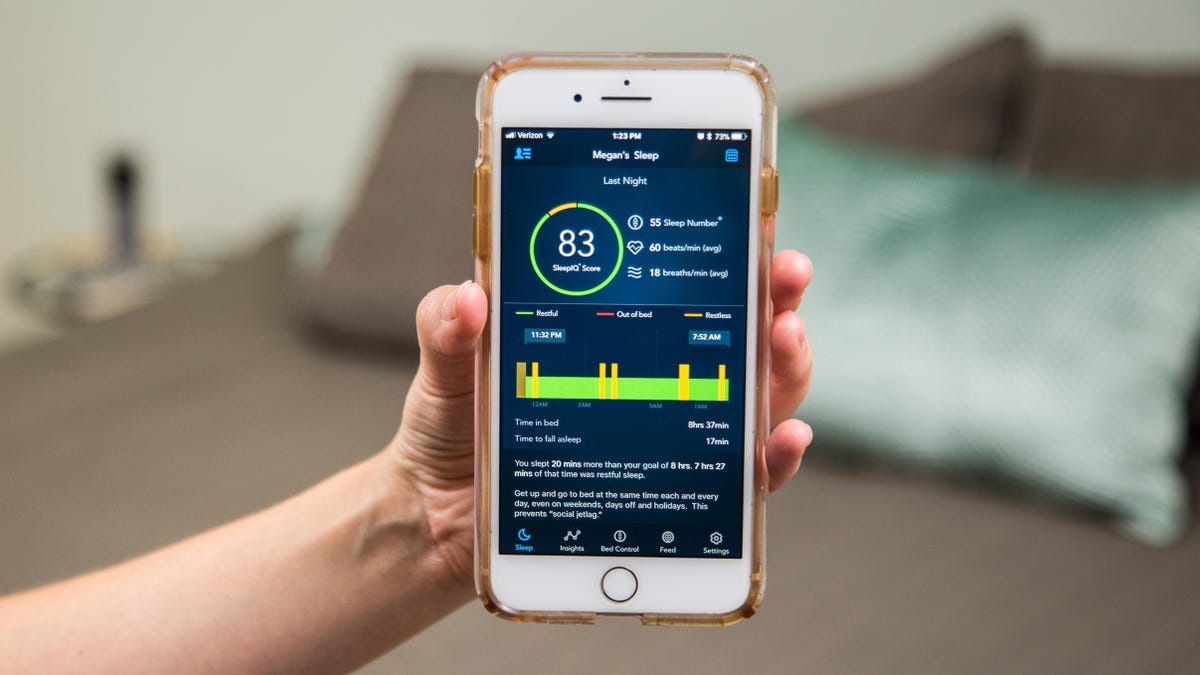The 3 best ways to track your sleep
Track your sleep schedule to improve your sleep hygiene (and your life).

Let's say you fell asleep last night at 11pm and woke at 7am, getting 8 hours of what seems like good rest. So, why are you still tired in the morning?
It's probably because you aren't getting sufficient deep sleep to truly restore your body and mind. But instead of guessing how many hours you're getting or wondering if you tossed and turned all night, you can get hard data by tracking your sleep.
Let's explore the many ways you can do it.
Read more: Proven ways to get better sleep tonight | Find the best mattress in 2020: 11 top brands compared
Use your phone
While it's a good idea to leave tech out of the bedroom, if you're like most people, your phone charges on your bedside table as you sleep. It's likely also replaced your alarm clock.
If you're already sleeping with your phone, make it work for you by tracking your sleep.
Sleep apps
There are several apps that use your phone's accelerometer or sonar waves emitted from your phone to detect movement. All you have to do is place your phone on the mattress next to you.
Every morning, you'll be able to see how long you slept and how much you moved while sleeping, which can indicate that you're not getting enough restorative deep sleep.
Our favorite sleep-tracking apps are SleepScore (Android and iOS), Sleep Cycle (Android and iOS) and Sleep Time (Android and iOS).
iPhone
The iPhone (and other iOS devices) uses a different approach to measure your sleep.
In the Clock app, the Bedtime feature lets you set your bedtime and wake up time. Once set, your phone will alert you when it's time to go to bed to get the amount of sleep you desire.
With this feature enabled, your phone pays attention to when you stop using it at night and when you reach for it in the morning to approximate the number of hours you slept. You can see that data in the Sleep Analysis section of the Health app.
Though apps are a great way to get started with sleep-tracking, they're not a perfect solution. They can be thwarted by mattress movement (if you sleep with a partner), your phone can fall off the bed, and they can also cause your phone to overheat if it's under sheets and blankets.
Fitness trackers
To get a better idea of how well you sleep -- how long you're in REM cycle sleep or whether you move around a lot while you're snoozing -- you can use a fitness tracker.
Many of these devices already come equipped to track sleep. Several Fitbit models, the Apple Watch, the Motiv Ring and others all track sleep efficiency by measuring your movements throughout the night.
Garmin's Vivosport and many other fitness trackers can also track your sleep habits.
Keep in mind, though, that because these devices aren't designed specifically for sleep, it's a good idea to double-check their accuracy. For example, according to a 2012 study (and a recent lawsuit), Fitbit's actigraph overestimates sleep by 67 minutes, which is pretty significant.
To make sure your fitness tracker isn't over- or underestimating how long you were out, use an app to be safe, or the good old-fashioned method of remembering when you went to sleep.
Smart beds and sensors
If you are serious about tracking your sleep, try a smart mattress or dedicated sleep sensor, such as the iFit Sleep HR or Eight Sleep Tracker.
Sensors fit under or over your existing mattress to track movement, plus heart and respiratory rates. They use that data to tell you how long it takes you to fall asleep and how long you spent in each cycle of sleep throughout the night.
The Eight Sleep Mars+ smart mattress tracks your movement and heart rate as you sleep.
Smart mattresses do the same things, but also often include heating and cooling modes and other premium features.
Rather than having a fitness tracker pull double duty, the main benefit to a dedicated sleep tracker is accuracy. The secondary benefit is not having to wear a wristband in your sleep or worry about it dying throughout the night.
Compile the data
Gathering all of this sleep data is only useful if you actually use it. After several nights of tracking your sleep, you'll end up with information on how much "deep" vs. "light" sleep you're getting, how often you move or wake up, time spent in each sleep cycle or -- in some cases -- how much you snore.
Unfortunately, most sleep apps and fitness trackers don't give you much advice on how to make changes to your sleep habits based on that data.
Here are some causes of common sleep issues:
If you're not hitting the number of hours you need: It's time to adjust your bedtime or wake up call.
If you're sleeping, but not getting much deep sleep: It could mean your bedroom is too hot or cold, or that you need to cut back on caffeine or alcohol. You might also have underlying sleep conditions, like sleep apnea or insomnia, that you should get checked out by a doctor.
If you wake up a lot at night or toss and turn: It could mean you're sleeping too hot, that caffeine or alcohol is interfering with your sleep, or you're dealing with stress.
Apps and sensors can help you understand what's happening while you're asleep, but they aren't stand-ins for going to the doctor. If you're waking up exhausted all the time or having trouble staying awake during the day, it's worth getting checked out for any underlying issues.
Now that you know how to track your sleep, here are ways your smart home can help you sleep better.
Also read how not all sleep tech is actually helping.